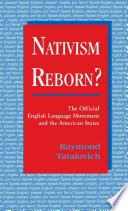Product desciption
Nativism Reborn Raymond Tatalovich by Raymond Tatalovich 9780813184869, 081318486X instant download after payment.
In July 1992 Senator Robert C. Byrd (D-WV) angrily suggested during floor debate... that the United States should not continue accepting immigrants mho speak no English. "I pick up the telephone and call the local garage," Byrd said. "I can't understand the person on the other side of the line. I'm not sure he can understand me. They're all over the place, and they don't speak English. We want more of this?" Later he apologized for the remark, saying, "I regret that in the heat of the moment I spoke unwisely." Is America in the midst of another backlash against foreigners? In the wide-ranging controversy over multiculturalism that has generated much heat in recent years, one of the most volatile issues is whether the United States should reflect a dominant English-speaking majority or encourage a multilingual culture. Tied up with this emotional issue is a growing anxiety on the part of many Americans about the new wave of non-European immigrants. "It is not without significance," says S.I. Hayakawa, who was a founder of U.S. English, "that pressure against English language legislation does not come from any immigrant group other than the Hispanic: not from the Chinese or Koreans or Filipinos or Vietnamese; nor from immigrant Iranians, Turks, Greeks, East Indians, Ghanians, Ethiopians, Italians, or Swedes." Raymond Tatalovich has conducted the first detailed, systematic, and empirical study of the official English movement in the United States, seeking answers to two crucial questions: What motivations underlie the agitation for official English? Does the movement originate at the grassroots level or is it driven by elites? Since 1980, fifteen states have passed laws establishing English as the official language -- Alabama, Arkansas, Arizona, California, Colorado, Florida, Georgia, Indiana, Kentucky, Mississippi, North Carolina, North Dakota, South Carolina, Tennessee, and Virginia. Three more laws, in Hawaii, Illinois, and Nebraska, predate the current agitation. The official language laws in ten of the states are wholly symbolic, but in the remaining eight they go beyond symbolism to stipulate some kind of enforcement. Four states have passed English Plus laws -- New Mexico, Oregon, Rhode Island, and Washington. In addition some major cities -- Atlanta, Cleveland, Dallas, San Antonio, Tucson, and Washington,D.C. -- have also adopted English Plus laws or resolutions. Tatalovich hypothesized five possible motivations for the official English movement: race (hostility of the majority toward a minority), ethnicity (conflict between minori-ties), class (reaction by lower socioeconomic groups), politics (partisan or ideological backlash), and culture (anti-foreign sentiment). His analysis is based on an eclectic range of sources, from historical documents, legal records, and court decisions to news accounts and interviews. In many southern states where the issue has recently assumed prominence, he found that support for the initiative is identified as a residue of nativism. Tatalovich empirically shows linkage between support today for official English and opposition in the South to immigration in the 1920s. This study not only is definitive but also is a dispassionate analysis of an issue that seems destined to become even more controversial in the next few years. It makes a notable contribution to the current debate over multiculturalism and will be of special interest to sociologists, historians of contemporary social history, linguists, legal scholars, and political scientists who study public policy, minority politics, and comparative state politics.


